Pre-K Language Nutrition Feeds Literacy Efforts in Crisp County
Print This Post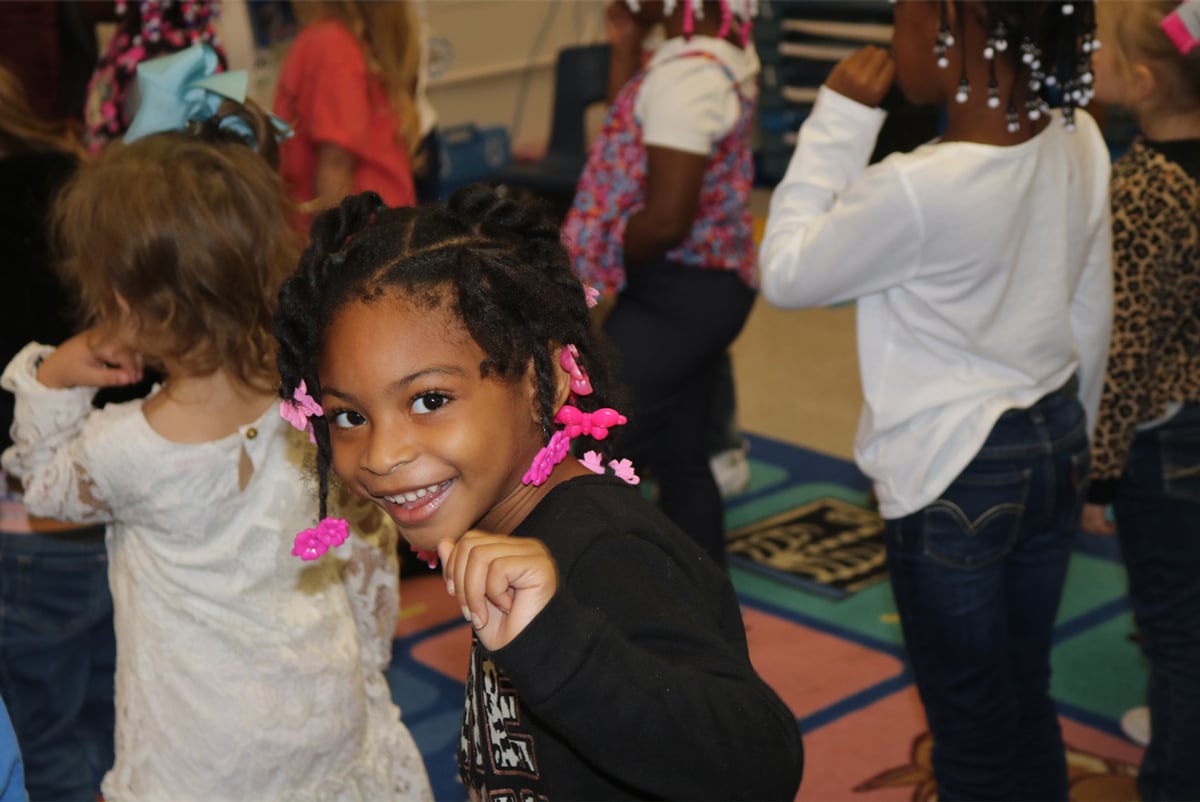
by Diana St. Lifer
There’s nothing unusual about a preschooler asking for help navigating the complexities of his clothing. However, the words one young boy used affirmed language nutrition efforts in Crisp County are making a difference.
Salley Edwards, Coordinated Early Intervening Services (CEIS) coordinator for Crisp County Schools and who has been with the Family Connection Collaborative five years, recounted the story a veteran teacher involved in the effort told her. “The young boy said, ‘I need assistance. I can’t fasten my pants,’ ” she said. “When you hear this type of vocabulary coming back from the children, you know it’s having an impact.”
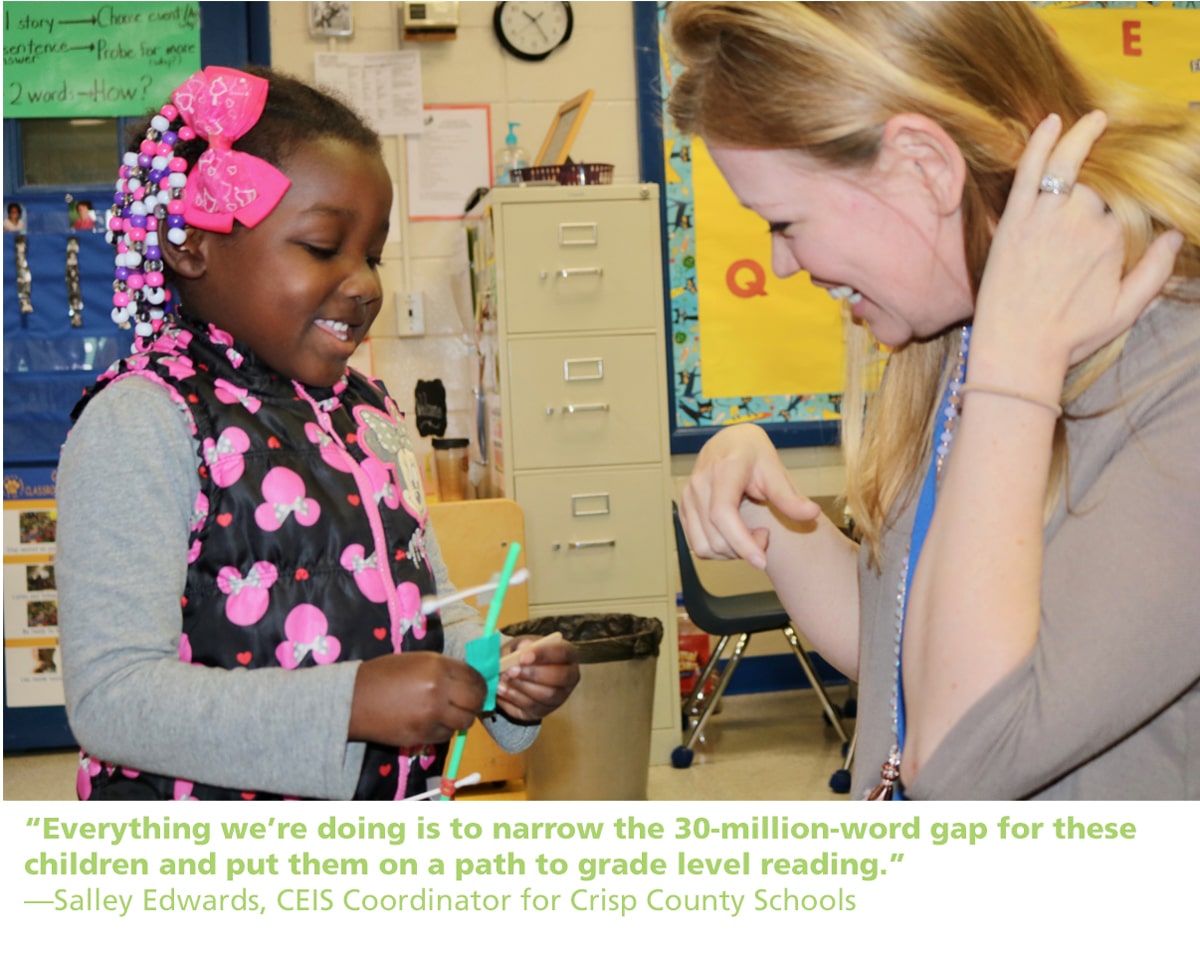 Crisp is one of 12 counties in Georgia Family Connection’s Early Childhood Health and Education (ECHE) cohort working to improve academic and wellness opportunities for children from birth to age 8. One of Crisp’s main strategies is to implement language nutrition initiatives for children from birth to age 3, and then bring increased literacy resources through the third grade. The Crisp cohort is hoping to increase the 23.7 percent of third graders reading at proficient level in the RELA Georgia Milestones Assessment.
Crisp is one of 12 counties in Georgia Family Connection’s Early Childhood Health and Education (ECHE) cohort working to improve academic and wellness opportunities for children from birth to age 8. One of Crisp’s main strategies is to implement language nutrition initiatives for children from birth to age 3, and then bring increased literacy resources through the third grade. The Crisp cohort is hoping to increase the 23.7 percent of third graders reading at proficient level in the RELA Georgia Milestones Assessment.
“We know from research that children’s vocabulary at age 3 is directly related to their long-term reading success,” said, Edwards, who is chair of Crisp ECHE Cohort and a former consultant with the Atlanta Speech School’s Rollins Center. “Everything we’re doing is to narrow the 30-million-word gap for these children and put them on a path to grade level reading.”
Studies show that children from low-income families hear roughly 30 million fewer words by age 3 than their affluent peers. In Crisp, that accounts for almost half the children in the county where, according to 2015 Kids Count data, 47.4 percent of children are living in poverty, a statistic that rose 1.5 percent from the previous year.
Sherry Evans, executive director of the Crisp County Community Council, stresses the importance of engaging children and their parents early on.
“The ECHE cohort has a zero to 8–year-old focus,” said Evans. “But because our county has few zero to 3-year-old child development programs, the majority of our work is focused on zero to 8.”
When the Crisp Collaborative joined the ECHE cohort in 2015, the strategy was to focus on training, awareness, access, and programming that would promote language nutrition at the earliest level. To be successful, Evans knew that participation from community partners would be essential.
“Our first year in the cohort involved great effort to ensure that the appropriate partners were at the table, creating a sound Collaborative,” she said. The work paid off, and there are 34 partner organizations dedicated to the cohort’s work. “Our partners are invested and committed.”
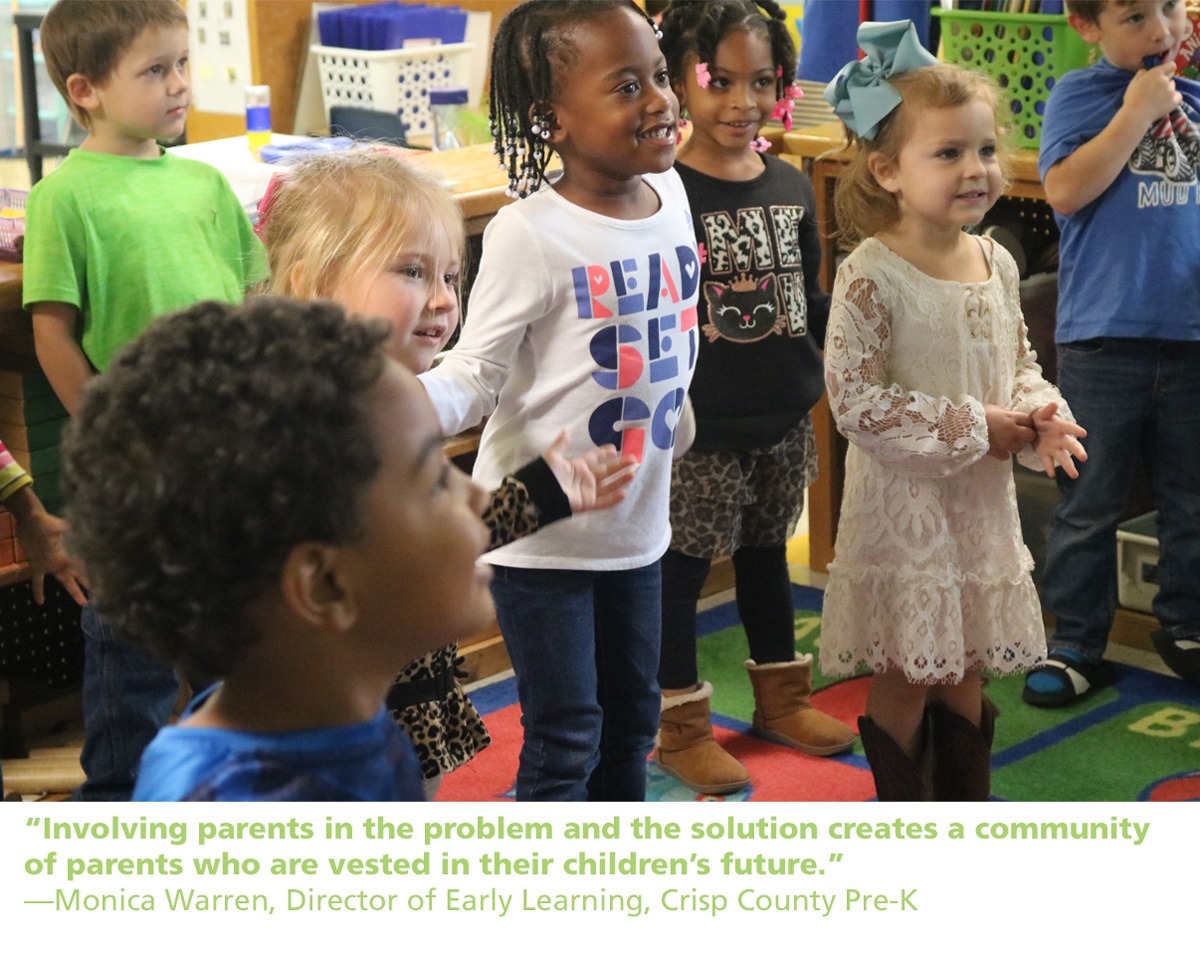 The greater challenge is engaging families in the process. Funding for home visitation programs have dwindled in the rural county where 46.8 percent of children are living in single-parent families and where transportation is a challenge.
The greater challenge is engaging families in the process. Funding for home visitation programs have dwindled in the rural county where 46.8 percent of children are living in single-parent families and where transportation is a challenge.
“Parents are key to a community being successful in breaking this literacy and poverty cycle we’re facing in Crisp County,” said Monica Warren, director of Early Learning, Crisp County Pre-K. “We often find that parents want to do the right thing and support their children, but they don’t know what to do. Involving parents in the problem and the solution creates a community of parents who are vested in their children’s future.”
Warren says parents are given the information and tools they need to implement language nutrition strategies in the home, as well as opportunities to practice with their children in the classroom with a skilled teacher. “The strategies are grounded in research and our results are proving the research to be true,” she said. “The journey has not been easy, but the strategies begin to sell themselves when the return is so impactful.”
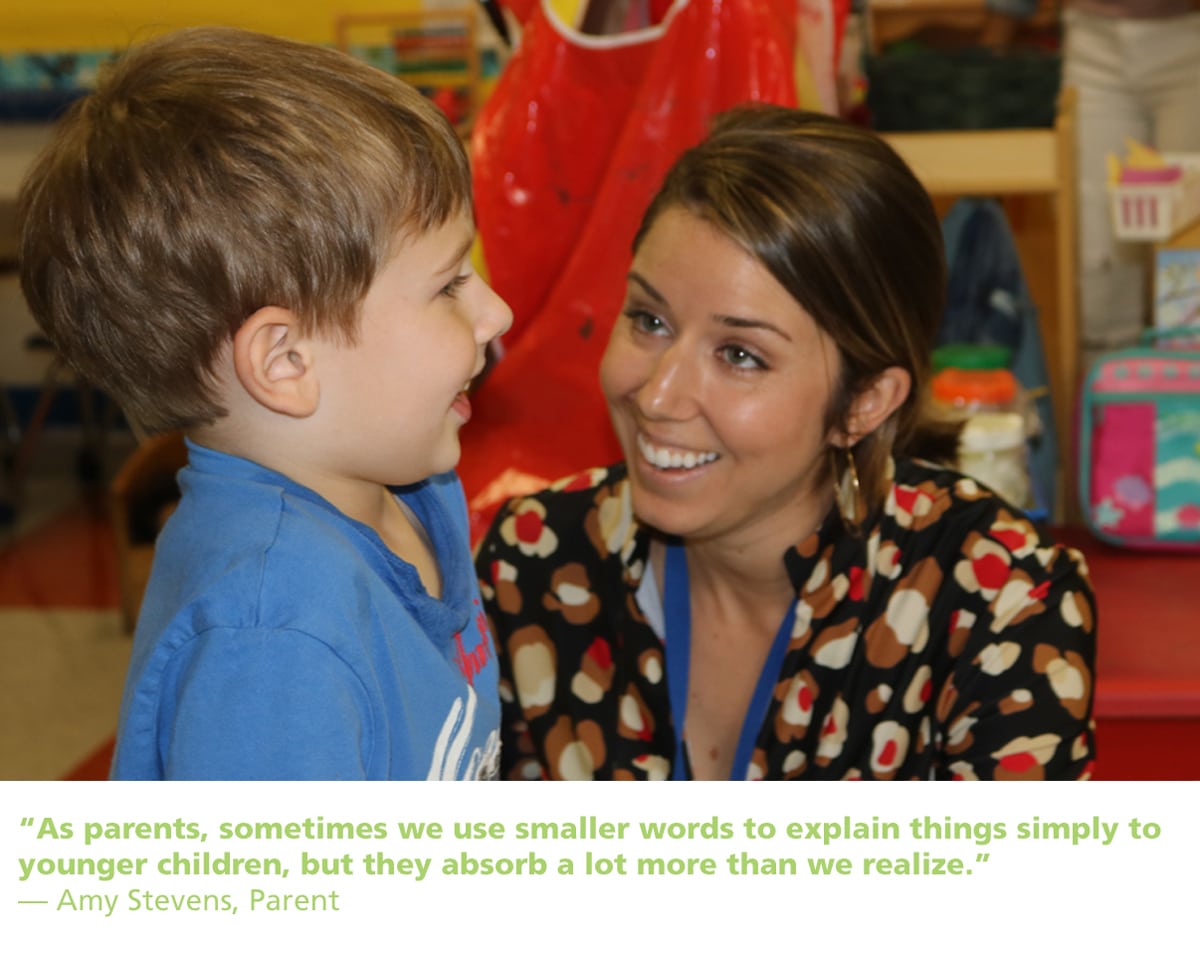 Amy Stevens recently participated in a literacy activity in her daughter Audrey’s pre-K class. Teachers read Martin Waddell’s Owl Babies to the students and their parents, and then guided them on related craft activity. “Several things about it were a good learning experience for me,” Stevens said. “The teachers talked to us about using vocabulary from the book as we were doing the craft and asking our children questions about what they remember about the book.”
Amy Stevens recently participated in a literacy activity in her daughter Audrey’s pre-K class. Teachers read Martin Waddell’s Owl Babies to the students and their parents, and then guided them on related craft activity. “Several things about it were a good learning experience for me,” Stevens said. “The teachers talked to us about using vocabulary from the book as we were doing the craft and asking our children questions about what they remember about the book.”
Stevens, who also has four other children ages 12, 10, 7, and 2, says the Pre-K literacy initiatives are making a positive impact. “Audrey comes home from school and says words my older children don’t know,” she said. “As parents, sometimes we use smaller words to explain things simply to younger children, but they absorb a lot more than we realize.”
Crisp Family Connection’s ECHE Cohort aims to ensure that the health care community and other service providers that work with new mothers receive resources and training to assist in a community-wide effort to strengthen language nutrition by promoting programs like Talk with Me Baby and Right from the Start. Georgia Family Connection’s Ministry Network also joined the cohort. One example of the faith-based community’s contribution is a program that provides crocheted baby caps along with educational information about the importance of talking with babies.
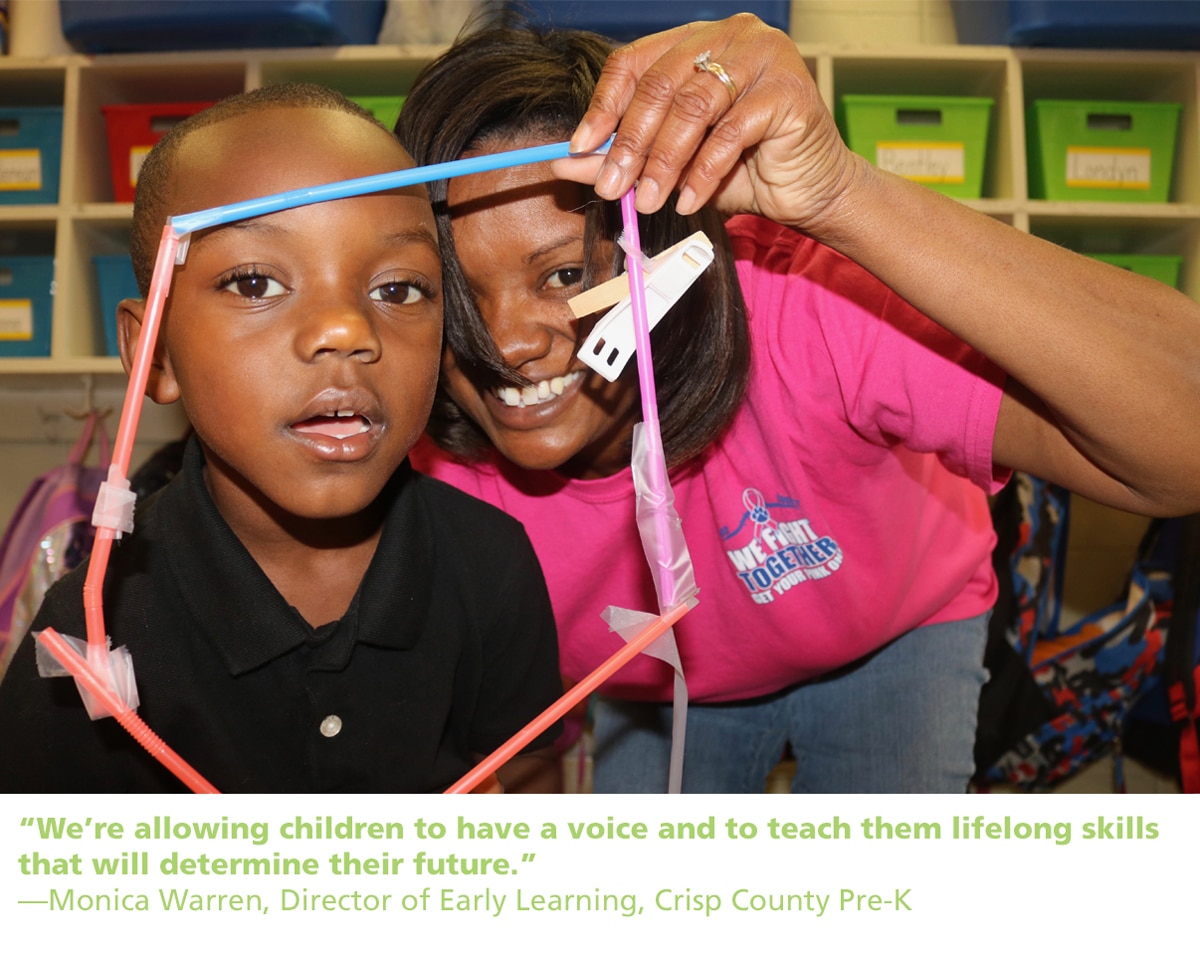 Beyond the language nutrition initiatives, Crisp Family Connection’s ECHE strategy also includes:
Beyond the language nutrition initiatives, Crisp Family Connection’s ECHE strategy also includes:
- raising awareness about child abuse prevention,
- strengthening ties between the school system and Head Start,
- increasing the number of children served through the Summer Feeding Program and coordinating Nutrition Service Providers collaboration,
- partnering with the Crisp Arts Alliance to provide literacy in art events,
- improving accessibility to mental health services and impacting systems change, and
- providing for educators’ training and resources on how to improve classroom success for children living in poverty.
Perhaps Warren summed up the county’s overall efforts best when she said, “We’re allowing children to have a voice and to teach them lifelong skills that will determine their future. We’re empowering teachers, students and parents.”
Diana St. Lifer is a professional writer with more than 25 years’ experience. She holds a bachelor’s degree in communications, a post-B.A. certificate in child advocacy, and is a certified professional life coach who specializes in teen and adolescent issues.
Low-birthweight births, childhood obesity, and not reading on grade level by third grade are serious threats to the well-being of Georgia’s families and children. Recognizing the impact these issues have on our state, Georgia Family Connection Partnership launched three initiatives dedicated to developing and implementing strategies that address these key indicators of child and family well-being.
Read more.
